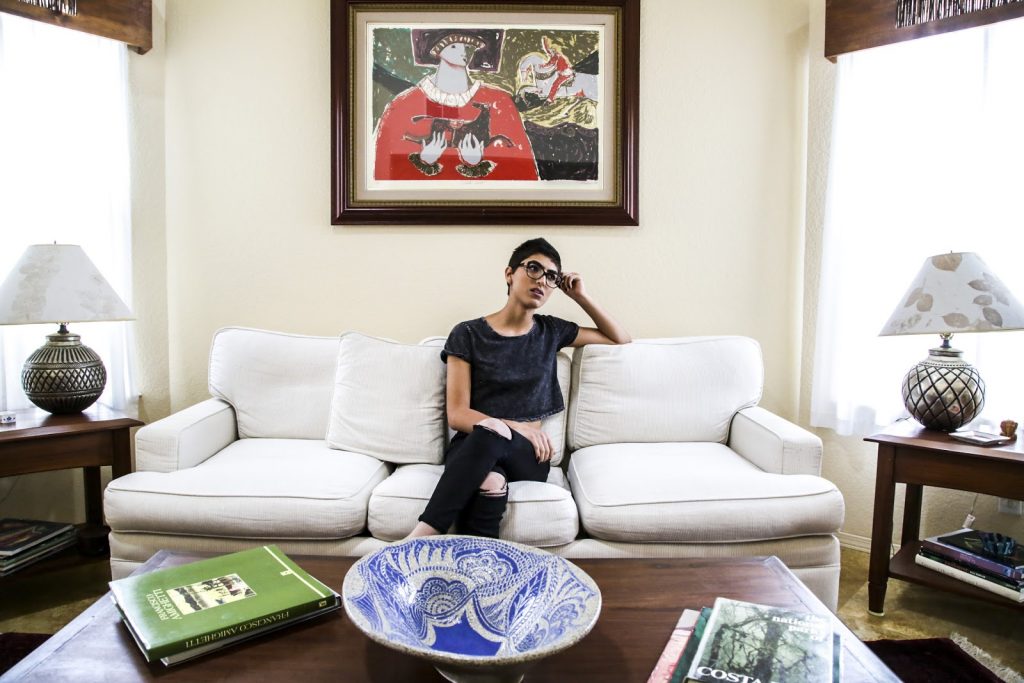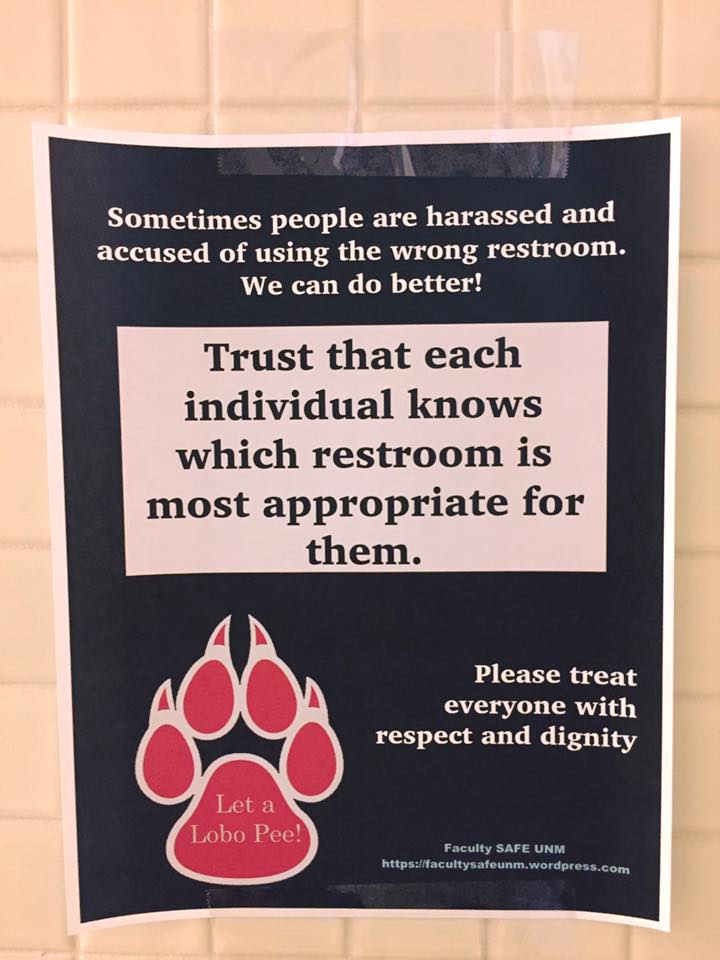
Albuquerque — As one of the most underrepresented and marginalized groups, transgender women of color face adverse harassment, from both institutions and individuals. Advocates like Stacy Fatemi are taking to social media to raise awareness.
According to a survey conducted by the Williams Institute in 2008 and 2009, out of a sample of 93 transgender and gender nonconforming people, 70 percent reported being physically assaulted and harassed in public restrooms. Trans youth are also subject to extreme bullying online.
Fatemi, a transgender woman of color and student at UNM, is using social media as an advocacy tool to reach out to the trans community in a safe way.
As an avid YouTube user, Fatemi uses this platform to educate her audience about the issues affecting the LGBTQ community, while also discussing her own transition.
“Empathy is the single strongest tool that we have in our arsenal as underrepresented people,” Fatemi said.
In one of her most recent videos, Fatemi discusses the Trump administration’s revocation of bathroom guidelines that former President Obama enacted to protect trans students from harassment at school.
“When you don’t allow a transgender student to use the restroom, you’re effectively expelling them,” Fatemi said.

Megan Aguilar / NM News Port
Janice Deveraux, the transgender affairs specialist at the LGBTQ center on UNM campus, says it’s time to be accepting of the transgender community.
“We’re not talking about wild things, we’re talking about going to the restroom,” Deveraux said.
“I think it’s absolutely absurd that people should have to plan their day around not using the restroom because they might get attacked.”
According to the Williams Institute of Transgender Research, kidney infections, urinary tract infections and dehydration are just some of the adverse health effects that trans people experience when avoiding the use of public restrooms.
Ten percent of trans people surveyed also reported that there were negative repercussions academically because of bathroom policies concerning trans students.
Guidelines highlighted by the Obama administration protected a student’s right to choose their preferred restroom, but with the recent repeal of these guidelines by the Trump administration, the LGBTQ community is concerned.
“American high schools and bullying go together like freaking peanut butter and jelly, what do you think is going to happen when a girl, who is viewed by many to not be authentic, walks into a male dominated space, where there are no authority figures, no cameras, no accountability. Just fists. You can’t have that,” Fatemi said.
It is unclear how many students on UNM campus have been harassed in restrooms. According to the 2015 Clery report, an annual document of reported crimes, there were three hate crimes on campus. Two were race related, and one related to the sexual orientation of the individual, according to the report.
Not only does the LGBTQ community face harassment in the privacy of restrooms, but online as well.
Fatemi, like many LGBT youth, has been targeted online. After she appeared in a Buzzfeed video discussing the benefits of Planned Parenthood, Milo Yiannopoulos, public speaker and face of the alt-right movement, posted Fatemi’s image on his Facebook page along with a list of her medications.
“I don’t care,” Fatemi said. Fatemi’s strength in her identity has helped her brush off incidents like these online.
“There are a lot of people, especially on the internet, who spout these intolerant views specifically to get a reaction out of people… those aren’t the people you can change,” Fatemi said.
Fatemi also acknowledges that everyone reacts to these situations in different ways.
About 42 percent of LGBT youth report that they have been harassed and bullied online, according to the Gay, Lesbian, and Straight Education Network. This is three times more than non-LGBT youth.
The study also finds that more LGBT youth spend time online in search of resources and connections.
Fatemi and Deveraux both believe that visibility of trans people as human and individuals is an important asset in trying to combat the harassment and bullying trans women and other members of the LGBT community face.
With nearly 41 percent of trans people contemplating suicide, being visible makes the abstract issues of the trans community, less abstract, says Fatemi.
According to the Williams Institute, the trans population makes up 0.6 percent of people in the United States. This means that out of the estimated 318.9 million people in the country., 1.4 million identify themselves as transgender.
“The more you know us, the less exotic we become,” Deveraux said.
However, being open about gender identity is not an option for a lot of LGBTQ youth.
Fatemi acknowledges there were struggles when coming out, and credits the “right circumstances” for her online presence. Moving out on her own, and graduating high school gave Fatemi the opportunity to express herself in a way that she had never been able to, she said.
“It was like being a kid again,” Fatemi said.
A survey conducted by the National Center for Transgender Equality in 2011 reports that nearly 57 percent of transgender and gender nonconforming people have experienced some level of family rejection. Because of this, Fatemi says she feels compelled to educate others about transgender issues.
According to NPR, New Mexico along with California, Georgia, and Hawaii have the highest percentage of trans-identifying adults, all at 0.8 percent of the population. However, there is still little information regarding the trans population in the state of New Mexico.
UNM is broadening its inclusiveness by supporting programs that promote the safety and equality of its students.
For instance, the university is supporting programs like the preferred name initiative, spearheaded by the LGBTQ center. This initiative still has to work its way through the academic affairs department and the policy council before it can be finalized. It would allow transgender students to use their preferred name for classes and housing.
UNM has also enacted a policy requiring that new structures on campus have universal restrooms available.
The LGBTQ center has a list of locations where universal restrooms can be found.

The UNM Policy Office website states that UNM complies with all federal and state laws regarding discrimination, and strives to accommodate all employees, faculty, students and guests.
Other advocacy groups on campus have also stepped in to promote safety and inclusion on campus. Faculty SAFE, an organization made up of 70 faculty members have put up fliers in Dane Smith Hall restrooms that read, “Trust that each individual knows which restroom is most appropriate for them.”
Fatemi, who is studying social justice and women’s studies at UNM, continues to share her transition with the online community.
Her YouTube series, “The American Trans Survival Guide,” documents everything from hormones and how to get them to femininity as a trans woman.
“Once we all become advocates, then it becomes normal to accept and love transgender people, and that’s what we need as a society,” Fatemi said.
Check out Megan and Diana on Twitter!